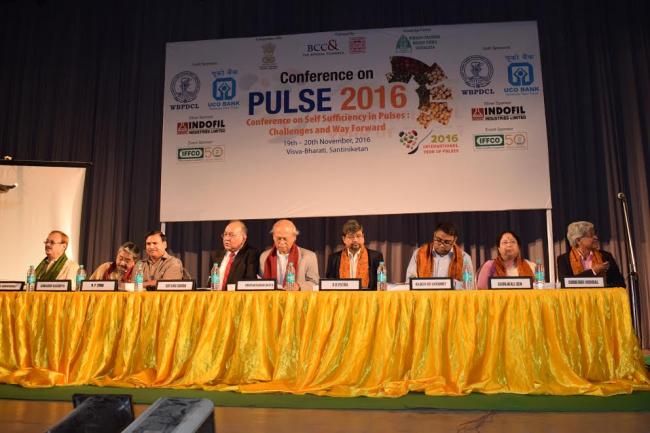19 Nov 2016, 05:35 pm Print

Diet is an important contributor to health, and to disease.
However, a large part of the population faces nutritional problems, from undernutrition and micronutrient deficiencies to obesity and diet-related diseases, or a mix of these. Pulses are a nutrient-rich food that, when included in a diet, can help fight malnutrition in both developed and developing countries.
From an economic perspective, pulses diversify smallholder income streams and mitigate risks associated with staple crop price fluctuations. When farmers grow pulses in addition to crops like maize, it helps buffer the farm from catastrophic disease, pest infestations and climate-related production disruptions.
.jpg) The International Year of Pulses (IYP) 2016 shows great potential for West Bengal agriculture in particular.
The International Year of Pulses (IYP) 2016 shows great potential for West Bengal agriculture in particular.
There is a need to celebrate IYP 2016 in the state, for addressing and removing the dietary imbalance, ensuring nutritional security - not just food security, harnessing remunerative returns from farming by rendering direct access to the deficit domestic market for the farmers or export through lndian Pulse & Grain Association as the case might be, and as an essential constituent of organic farming even with local cultivators.
In this backdrop, The Bengal Chamber of Commerce & Industry echoes the concern of the UN and is seeking to trigger off actions by creating awareness and enhanced research support.
The Chamber had organised ‘Pulse 2016’ - Self Sufficiency in Pulses: Challenges and Way Forward, in association with Visva-Bharati, Santiniketan. The knowledge partner for this event is Bidhan Chandra Krishi Viswavidyalaya, West Bengal.
Speakers included: Prof. Sarthak Chowdhury,Principal P.S.B., Visva-Bharati; Dr. Rajeev Kumar Varshney, Director,Centre of Excellence in Genomics, The International Crops Research Institute for the Semi-Arid Tropics (ICRISAT), Hyderabad; Ambarish Dasgupta, Past President, The Bengal Chamber; Sutanu Ghosh , President, The Bengal Chamber, Dr. Swapan Kumar Dutta, Vice-Chancellor, Visva Bharati University; Dr. D.D. Patra, Vice-Chancellor, Bidhan Chandra Krishi Viswavidyalaya; Prof. Sabujkali Sen, Director (Studies, Educational Innovative & Rural Reconstruction); Prof. Subhendu Mondal, Siksha Bhavana; Dr. N.P. Singh, Director, Indian Institute of Pulses Research, Kanpur; among others.
.jpg) “Pulses are incredibly rich in their nutritional value; they are small but densely packed with protein – double the amount found in wheat and three times that of rice. Pulses are also rich in complex carbohydrates, micronutrients, protein and B-vitamins, which are vital parts of a healthy diet,” said Sutanu Ghosh, President of The Bengal Chamber.
“Pulses are incredibly rich in their nutritional value; they are small but densely packed with protein – double the amount found in wheat and three times that of rice. Pulses are also rich in complex carbohydrates, micronutrients, protein and B-vitamins, which are vital parts of a healthy diet,” said Sutanu Ghosh, President of The Bengal Chamber.
“When grown in rotation with other crops, pulses help improve staple crop (e.g. rice/ wheat / maize) yields by breaking soil-borne pests and disease cycles that afflict these crops,” he said.
- Same price, smarter result: Anthropic drops major AI surprise
- Meta, NVIDIA announce long-term infrastructure partnership. Key details inside
- No one above the law: UN experts call for action over Epstein Files
- Teen with loaded shotgun races toward US Capitol — Arrested in dramatic standoff
- Power shift in Dhaka! Tarique Rahman takes oath as Bangladesh PM





-1763561110.jpg)
